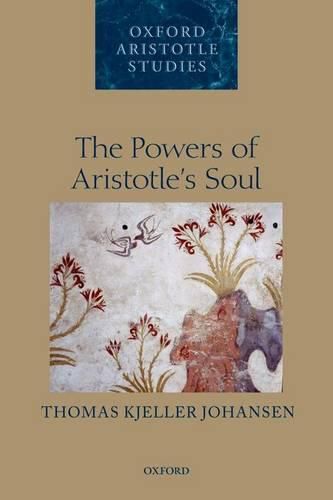Readings Newsletter
Become a Readings Member to make your shopping experience even easier.
Sign in or sign up for free!
You’re not far away from qualifying for FREE standard shipping within Australia
You’ve qualified for FREE standard shipping within Australia
The cart is loading…






Aristotle is considered by many to be the founder of ‘faculty psychology’–the attempt to explain a variety of psychological phenomena by reference to a few inborn capacities. In The Powers of Aristotle’s Soul, Thomas Kjeller Johansen investigates his main work on psychology, the De Anima, from this perspective. He shows how Aristotle conceives of the soul’s capacities and how he uses them to account for the souls of living beings. Johansen offers an original account of how Aristotle defines the capacities in relation to their activities and proper objects, and considers the relationship of the body to the definition of the soul’s capacities. Against the background of Aristotle’s theory of science, Johansen argues that the capacities of the soul serve as causal principles in the explanation of the various life forms. He develops detailed readings of Aristotle’s treatment of nutrition, perception, and intellect, which show the soul’s various roles as formal, final and efficient causes, and argues that the so-called ‘agent’ intellect falls outside the scope of Aristotle’s natural scientific approach to the soul. Other psychological activities, various kinds of perception (including ‘perceiving that we perceive’), memory, imagination, are accounted for in their explanatory dependency on the basic capacities. The ability to move spatially is similarly explained as derivative from the perceptual or intellectual capacities. Johansen claims that these capacities together with the nutritive may be understood as ‘parts’ of the soul, as they are basic to the definition and explanation of the various kinds of soul. Finally, he considers how the account of the capacities in the De Anima is adopted and adapted in Aristotle’s biological and minor psychological works.
$9.00 standard shipping within Australia
FREE standard shipping within Australia for orders over $100.00
Express & International shipping calculated at checkout
Aristotle is considered by many to be the founder of ‘faculty psychology’–the attempt to explain a variety of psychological phenomena by reference to a few inborn capacities. In The Powers of Aristotle’s Soul, Thomas Kjeller Johansen investigates his main work on psychology, the De Anima, from this perspective. He shows how Aristotle conceives of the soul’s capacities and how he uses them to account for the souls of living beings. Johansen offers an original account of how Aristotle defines the capacities in relation to their activities and proper objects, and considers the relationship of the body to the definition of the soul’s capacities. Against the background of Aristotle’s theory of science, Johansen argues that the capacities of the soul serve as causal principles in the explanation of the various life forms. He develops detailed readings of Aristotle’s treatment of nutrition, perception, and intellect, which show the soul’s various roles as formal, final and efficient causes, and argues that the so-called ‘agent’ intellect falls outside the scope of Aristotle’s natural scientific approach to the soul. Other psychological activities, various kinds of perception (including ‘perceiving that we perceive’), memory, imagination, are accounted for in their explanatory dependency on the basic capacities. The ability to move spatially is similarly explained as derivative from the perceptual or intellectual capacities. Johansen claims that these capacities together with the nutritive may be understood as ‘parts’ of the soul, as they are basic to the definition and explanation of the various kinds of soul. Finally, he considers how the account of the capacities in the De Anima is adopted and adapted in Aristotle’s biological and minor psychological works.